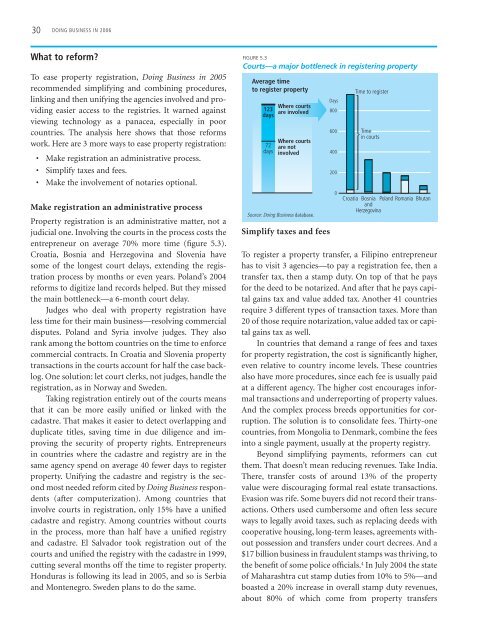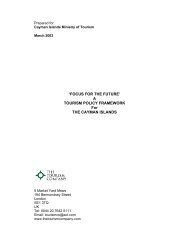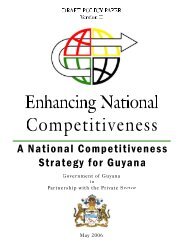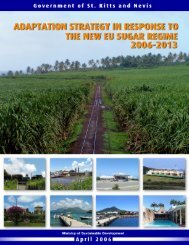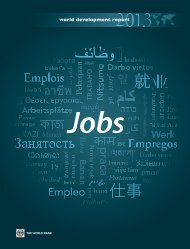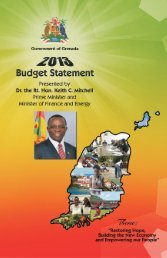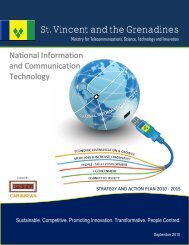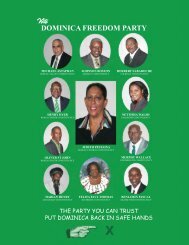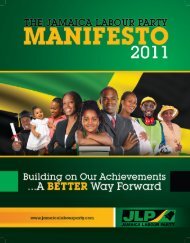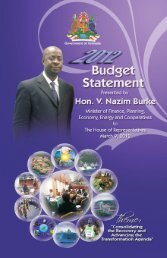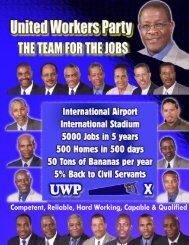Creating
Doing Business in 2006 -- Creating Jobs - Caribbean Elections
Doing Business in 2006 -- Creating Jobs - Caribbean Elections
You also want an ePaper? Increase the reach of your titles
YUMPU automatically turns print PDFs into web optimized ePapers that Google loves.
30 DOING BUSINESS IN 2006<br />
What to reform?<br />
To ease property registration, Doing Business in 2005<br />
recommended simplifying and combining procedures,<br />
linking and then unifying the agencies involved and providing<br />
easier access to the registries. It warned against<br />
viewing technology as a panacea, especially in poor<br />
countries. The analysis here shows that those reforms<br />
work. Here are 3 more ways to ease property registration:<br />
• Make registration an administrative process.<br />
• Simplify taxes and fees.<br />
• Make the involvement of notaries optional.<br />
Make registration an administrative process<br />
Property registration is an administrative matter, not a<br />
judicial one. Involving the courts in the process costs the<br />
entrepreneur on average 70% more time (figure 5.3).<br />
Croatia, Bosnia and Herzegovina and Slovenia have<br />
some of the longest court delays, extending the registration<br />
process by months or even years. Poland’s 2004<br />
reforms to digitize land records helped. But they missed<br />
the main bottleneck—a 6-month court delay.<br />
Judges who deal with property registration have<br />
less time for their main business—resolving commercial<br />
disputes. Poland and Syria involve judges. They also<br />
rank among the bottom countries on the time to enforce<br />
commercial contracts. In Croatia and Slovenia property<br />
transactions in the courts account for half the case backlog.<br />
One solution: let court clerks, not judges, handle the<br />
registration, as in Norway and Sweden.<br />
Taking registration entirely out of the courts means<br />
that it can be more easily unified or linked with the<br />
cadastre. That makes it easier to detect overlapping and<br />
duplicate titles, saving time in due diligence and improving<br />
the security of property rights. Entrepreneurs<br />
in countries where the cadastre and registry are in the<br />
same agency spend on average 40 fewer days to register<br />
property. Unifying the cadastre and registry is the second<br />
most needed reform cited by Doing Business respondents<br />
(after computerization). Among countries that<br />
involve courts in registration, only 15% have a unified<br />
cadastre and registry. Among countries without courts<br />
in the process, more than half have a unified registry<br />
and cadastre. El Salvador took registration out of the<br />
courts and unified the registry with the cadastre in 1999,<br />
cutting several months off the time to register property.<br />
Honduras is following its lead in 2005, and so is Serbia<br />
and Montenegro. Sweden plans to do the same.<br />
<br />
<br />
<br />
<br />
<br />
<br />
<br />
<br />
<br />
<br />
<br />
<br />
<br />
<br />
Simplify taxes and fees<br />
<br />
<br />
<br />
<br />
<br />
<br />
<br />
<br />
<br />
<br />
<br />
<br />
To register a property transfer, a Filipino entrepreneur<br />
has to visit 3 agencies—to pay a registration fee, then a<br />
transfer tax, then a stamp duty. On top of that he pays<br />
for the deed to be notarized. And after that he pays capital<br />
gains tax and value added tax. Another 41 countries<br />
require 3 different types of transaction taxes. More than<br />
20 of those require notarization, value added tax or capital<br />
gains tax as well.<br />
In countries that demand a range of fees and taxes<br />
for property registration, the cost is significantly higher,<br />
even relative to country income levels. These countries<br />
also have more procedures, since each fee is usually paid<br />
at a different agency. The higher cost encourages informal<br />
transactions and underreporting of property values.<br />
And the complex process breeds opportunities for corruption.<br />
The solution is to consolidate fees. Thirty-one<br />
countries, from Mongolia to Denmark, combine the fees<br />
into a single payment, usually at the property registry.<br />
Beyond simplifying payments, reformers can cut<br />
them. That doesn’t mean reducing revenues. Take India.<br />
There, transfer costs of around 13% of the property<br />
value were discouraging formal real estate transactions.<br />
Evasion was rife. Some buyers did not record their transactions.<br />
Others used cumbersome and often less secure<br />
ways to legally avoid taxes, such as replacing deeds with<br />
cooperative housing, long-term leases, agreements without<br />
possession and transfers under court decrees. And a<br />
$17 billion business in fraudulent stamps was thriving, to<br />
the benefit of some police officials. 4 In July 2004 the state<br />
of Maharashtra cut stamp duties from 10% to 5%—and<br />
boasted a 20% increase in overall stamp duty revenues,<br />
about 80% of which come from property transfers


